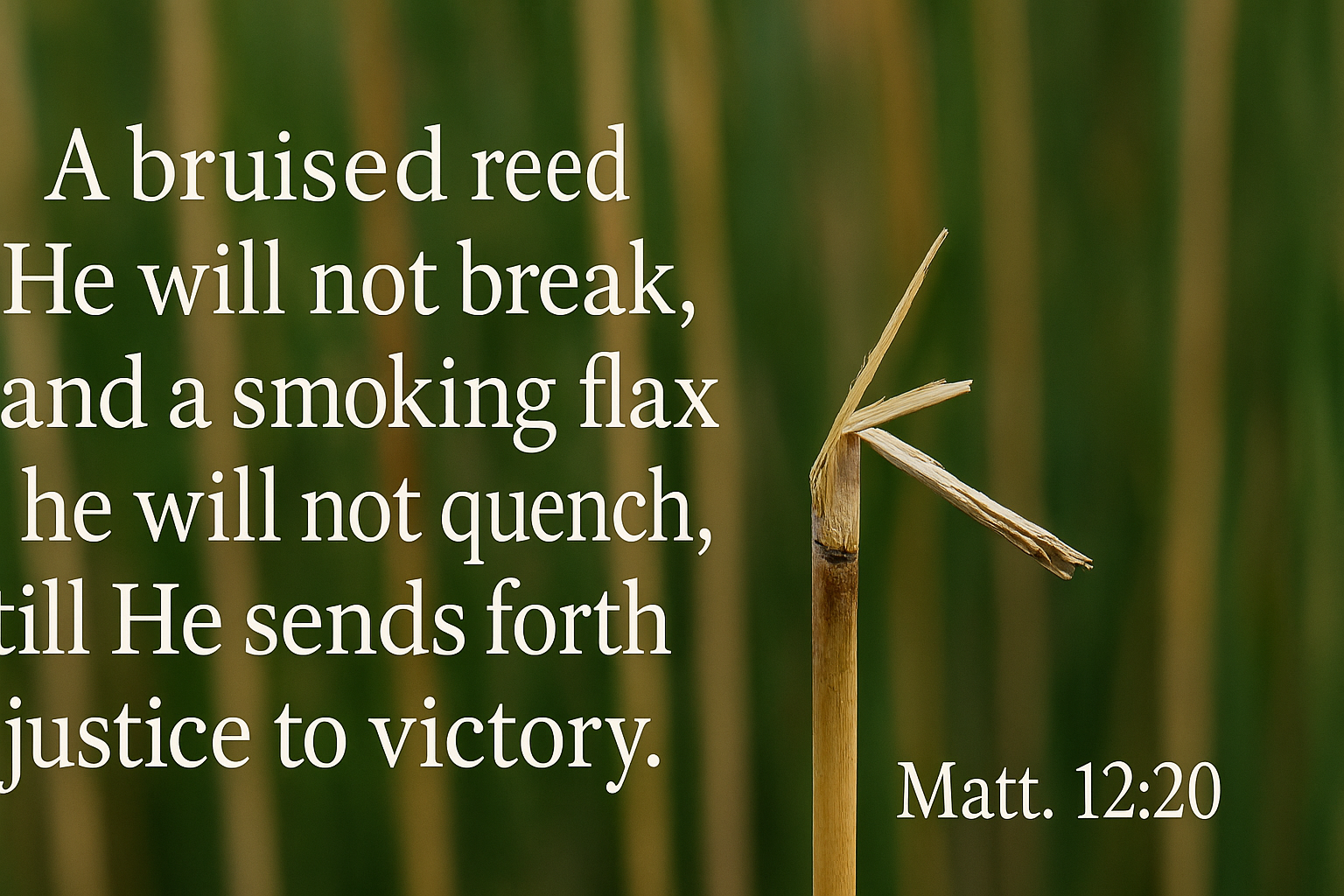What Did Jesus Mean When He Said, “A Bruised Reed He Will Not Break”?
Share

Every person deals with wounds and hurt. Living in a broken world, we get betrayed and abused by authorities, family, or friends. Those who should love us often don’t.
To add to the brokenness, sometimes we act as the villains, too. We fail others and choose ourselves over generosity and loving people.
Many people in the world have a skewed view of God. They see him as harsh, strict, quick to judge and reject. This twisted view of God comes from different sources, possibly combined—bad spiritual teaching, Christians speaking truth apart from love, a world trying to resist God, and Satan ready to lie about the Lord. As hurt people, we seek love and relief, and this wrong understanding of God keeps us from engaging with him.
However, God is love. Jesus revealed such compassion radically in his ministry, and he came to reveal the Father. As an example, Jesus used poetic imagery to describe how loving and caring the Father is, saying, “A bruised reed he will not break.” As we explore the context and Christ’s words, we can better see how much the Father loves and seeks to heal the broken.
Where Does Jesus Say “A Bruised Reed He Will Not Break”?
The apostle Matthew quotes from Isaiah 42:1-4 in Matthew 12:18-21, revealing how his ministry continued to fulfill prophecy as the Servant of the Lord. Isaiah wrote how God’s chosen servant would bring justice with compassion and gentleness.
Matthew 12:20 says, “A bruised reed He will not break, and a smoking flax he will not quench, till He sends forth justice to victory.”

Jesus has another conflict with the Pharisees in Matthew 12. Christ had healed a man with a withered hand on the Sabbath. This angered Jewish leaders, who believed it was against God’s law to even heal on the Sabbath. The leaders started to plan to destroy Jesus (Matthew 12:14). While they conspired, Jesus left the synagogue, but a huge crowd followed him. He kept teaching and healing. But he warned them not to tell anyone what he did, keeping a low profile and acting in mercy.
Matthew quotes from Isaiah 42 to show how Jesus fulfilled prophecy with his loving and kind character. He wouldn’t quarrel or cry aloud, and he wouldn’t break a bruised reed or snuff out a smoldering wick. Isaiah wrote about this Servant as someone who would bring justice to the nations, the whole world, conquering through love and not with earthly power.
The Servant of the Lord in Isaiah 42 is the same figure known as the suffering servant, especially spoken about in Isaiah 52:13-53:12. The prophets described the Servant as chosen by God, filled with the Spirit, and sent to bring justice, healing, and salvation. The Servant would suffer, be rejected, bear peoples' sins, and then be exalted. Rabbinical literature argued over whether this Suffering Servant was the same as the Messiah, but the Gospel writers showed how Jesus' ministry, death, and resurrection fulfilled the prophetic suffering servant and the Messiah.
Matthew’s gospel was written mainly for a Jewish audience. The apostle quoted more from the Old Testament than any other gospel writer. Matthew wanted to show how Jesus fulfilled the Old Testament, especially the prophetic predictions of the Messiah, the Suffering Servant, and the Prophet. At the same time, as someone Jesus personally encountered and called, Matthew shares the account of Jesus ministering to the common people, the marginalized and outcasts.
What Was Jesus’ Message When He Said, "A Bruised Reed He Will Not Break"?
Jesus healed a man on the Sabbath. The man had been at the synagogue with his infirmity. Upon seeing him in this condition, Jesus challenged the religious leaders, whether or not it was lawful to heal on the Sabbath. Matthew doesn’t record any answer, and Jesus doesn’t seem to wait. He compares the man to a sheep. “What man is there among you who has one sheep, and if it falls into a pit on the Sabbath, will not lay hold of it and lift it out? Of how much more value then is a man than a sheep? Therefore it is lawful to do good on the Sabbath.” (Matthew 12:11)
Christ points out their hypocrisy. If they had a sheep, and it fell into danger, they would help it on the Sabbath. Yet they considered healing a man on the same day a heretical act, breaking God’s Law. This goes to the heart of who they believed God to be. The religious leaders didn’t understand Yahweh to be first compassionate and loving. Jesus clearly states how the man had more value to God than a sheep.
Then Jesus healed him.
The Jewish leaders didn’t respond with humility and repentance. No, they planned how they would kill him.
Jesus reveals how God’s heart is for the weak, the wounded, and weary. God isn’t a harsh judge; Jesus isn’t a violent king. As further evidence, when Jesus left the synagogue, many people followed, and he healed all who were sick. He didn’t ask whether it was allowed or if they earned it. He simply healed.
Matthew reaches back to Isaiah to show the principles happening.
A bruised reed would normally be dismissed or thrown away; a smoldering wick, not enough to catch anything else on fire, almost dead itself, it would be snuffed out. But Jesus did the opposite. By healing the sick, people whom their society likely cast out or dismissed, he offered new life and restoration, empowerment. Jesus came to reveal the Father, and the Father saw their brokenness. Not only does he not reject you, he has drawn near through Immanuel to heal us.
The account shows how the Jews became the persecutors of the suffering servant. The Pharisees taught a God who sought law-keeping, external obedience, and remaining separate from the unclean or “sinners.” The common system portrayed an exacting and quick to punish God. For them, the bruised and smoldering (those who failed the Law or ritually impure) were rejected or ignored.
This tender and gentle view of God contrasted with the cold, legalistic model many had heard about. Jesus didn’t diminish God’s holiness or justice, but he revealed a fuller picture of the Father. God’s mercy triumphs over judgment (James 2:13).
For the broken and poor, Jesus’ message was absolutely good news, which is why they followed him out of the synagogue. However, for those with religious authority and power, they couldn’t accept a Messiah who ate with sinners and healed on the Sabbath. And yet, Jesus had to do this to reveal the true heart of his Father.
What Other Scriptures Support “A Bruised Reed He Will Not Break”?
The Bible continually reveals a merciful, longsuffering God who cares for the weak, broken, and forgotten. Unfortunately, the religious leaders read these verses in the Old Testament and failed to see the loving God, unable to act the same to the poor in their own culture.
Psalm 34:18 says, “The Lord is near to those who have a broken heart, and saves such as have a contrite spirit.” While the world might think God is far from the broken, God actually draws closer to the wounded and humble, to save them.
The prophet Isaiah reiterates this in 57:15, when God says, “I dwell in the high and holy place, with him who has a contrite and humble spirit, to revive the spirit of the humble.” The Lord shares how he lives in a heavenly place, referring to a higher “holy of holies.” There, God keeps the humble with him and does a miraculous, reviving work in their lives.
Psalm 147:3 further says, “He heals the brokenhearted and binds up their wounds.” The Lord doesn’t judge the weak and sick, to condemn or dismiss then. The opposite proves true. He intentionally seeks them out to heal the crushed in spirit.
A later prophet gives a clear religious requirement. “What does the Lord require of you but to do justly, to love mercy, and to walk humbly with your God?” (Micah 6:8) In literature, this is a rhetorical question. The answer is self-evident—God requires nothing else but mercy and humility, mirroring God’s compassion to the poor and marginalized.
Jesus had to reveal this Father, consistent throughout the Jewish scriptures. To do otherwise would be to lie about God, not speak or live truth.
As followers of Jesus, we’re called to reveal the same God.
What Does “A Bruised Reed He Will Not Break” Mean for Christians Today?
“A bruised reed he will not break” reminds us how God is a loving, merciful, and generous Father. He sees us in our weak and wounded moments, even from our own failures, and he chooses love and salvation over condemnation. In a world that often overlooks the rejected or broken, God draws even closer. He strengthens when others would abandon.
Each of us carries wounds of one sort or another—disappointments, sins, fears—and we long to be seen, heard, and known during them. God doesn’t stand distant; he meets us there, as Jesus did coming to earth as Immanuel. The Father doesn’t shame or throw us away as useless. He listens to our cries, binds our wounds, and lifts us up, dignifying and valuing us. If we turn to him, he carries us to his heavenly home to minister to us there. The nearness is personal and uplifting. Jesus became the Good Shepherd spoken of in the Old Testament (Ezekiel 34:15-16).
Even more, Jesus took on suffering to heal us. He not only acted gently with the bruised reed, he redeemed by willingly giving his own life, self-sacrificially. By his stripes, we were healed (Isaiah 53:5).
This should not only comfort us but transform the way we treat others. We must not become the persecutors of the Servant, resisting his love for others. We live in a hurting world, filled with people who deal with pain, often hiding it behind silence or anger or addiction. When we live from the Spirit, we choose understanding, patience, and compassion instead of judgment and pride. As Paul tells us in Ephesians 4:32, “Be kind to one another, tenderhearted, forgiving one another, as God in Christ forgave you.”
When we see a bruised reed or a smoking flax, the barely alive, this calls us to lift them up just as God does for us. We become vessels of his peace and mercy, helping others feel seen, heard, and loved. Treating others with such gentleness and grace displays the heart of the Father. He heals instead of harms. He loves the weakest and the worst. “A bruised reed he will not break” becomes a promise, a comfort, and a calling.
Peace.
Image created using AI technology and subsequently edited and reviewed by our editorial team.
